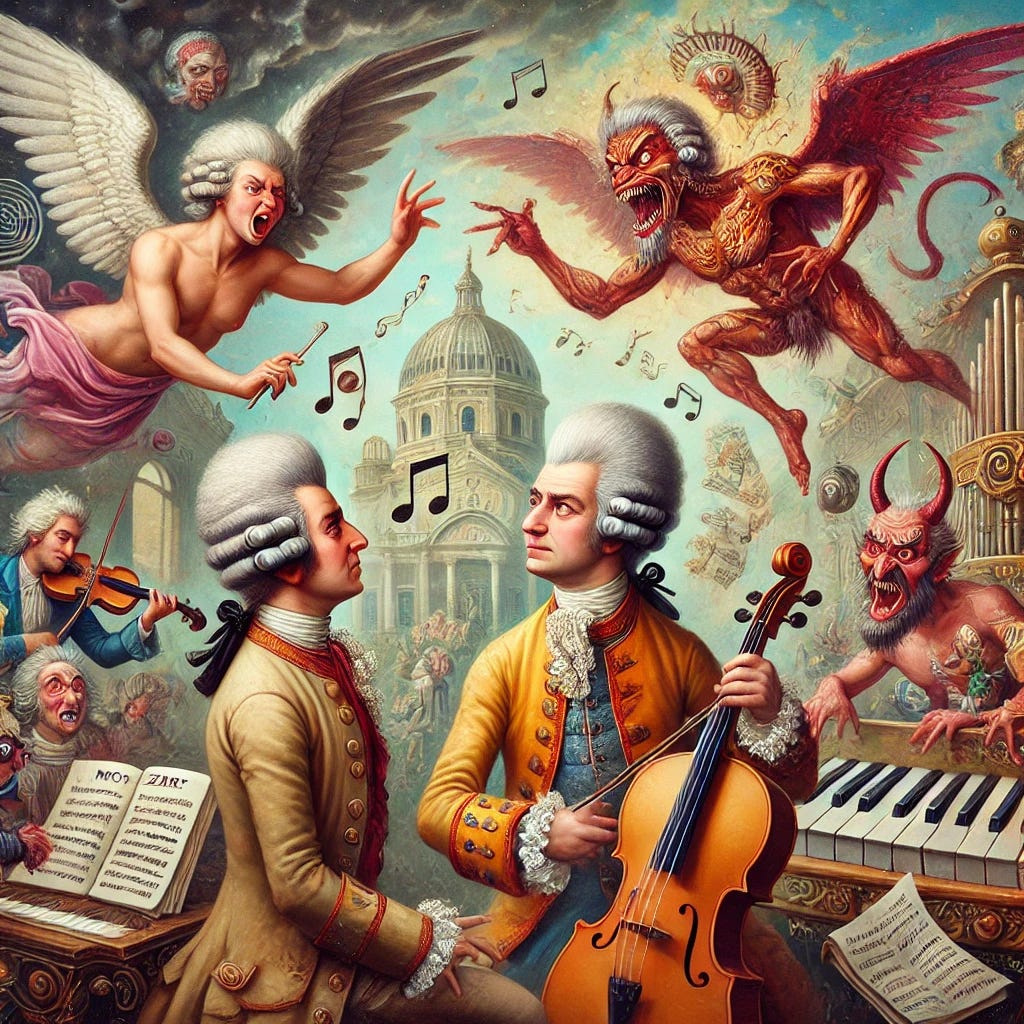Maybe Mozart doesn't suck
My curious Angel and hipster Devil fight it out
Mozart is boring
Music has been my longest running and most consistent interest throughout my life. I have a Devil and Angel on my shoulders. The Angel strives to appreciate as wide an array of music as possible, to “crack cultural codes,” in Tyler Cowen’s phrase. This extends from the niche and avantgarde (e.g., free jazz) to the most popular things (e.g., 2000-2010 pop-punk and mainstream metal that I wrote off at the time). Most popular music is popular for a reason.
But The Devil lives on the other shoulder, and he’s a snobby hipster. I will never not deep down have some impulse to hold an iconoclastic take (those who know me know this extends beyond music). I have at least shed much of the other hipster stupidness that infected me in my early teenage years.
As I’ve gotten more and more into classical music in the last few years (The Angel at work), The Devil has insisted with little curiosity that I hate Mozart. It’s a fun take to sling around: who hates Mozart?
But it is not just aimless iconoclasm. His music is often “merely” pretty, too neat and tidy. My attention slides off of it. Here’s Norman Lebrecht from 2006 making the case against Mozart:
The key test of any composer's importance is the extent to which he reshaped the art. Mozart, it is safe to say, failed to take music one step forward. Unlike Bach and Handel who inherited a dying legacy and vitalised it beyond recognition, unlike Haydn who invented the sonata form without which music would never have acquired its classical dimension, Mozart merely filled the space between staves with chords that he knew would gratify a pampered audience. He was a provider of easy listening, a progenitor of Muzak. …
He lacked the rage of justice that pushed Beethoven into isolation, or any urge to change the world. Mozart wrote a little night music for the ancien regime. He was not so much reactionary as regressive, a composer content to keep music in a state of servility so long as it kept him well supplied with frilled cuffs and fancy quills. …
Mozart is a menace to musical progress, a relic of rituals that were losing relevance in his own time and are meaningless to ours. Beyond a superficial beauty and structural certainty, Mozart has nothing to give to mind or spirit in the 21st century. Let him rest. Ignore the commercial onslaught. Play the Leningrad Symphony. Listen to music that matters.
I can’t find the quote, but I believe I read it in Lebrecht’s Why Beethoven: someone like Beethoven demands your attention even if you try to treat it as background. By contrast, Mozart has often felt like pretty background music, even in comparison to his contemporary Haydn. As my friend said, you don’t want to put Beethoven on at a party, but Mozart works quite well for a cocktail hour.
In classical music I’ve historically been attracted more to artists that have some kind of dynamism or tension in their music and less to party music. But pretty background music is the functional role that classical music often played in the past. It’s also how many of my peers relate to it these days, as essentially ambient stock relaxing background music, old-fi beats to study to. There’s lots of videos on YouTube like this with tens of millions of views:
But recently I found myself turning on our local classical radio station before bed after a long and stressful day and being unhappy to hear something brash and romantic. I like Beethoven but don’t generally love the 19th century symphonic music that came in his wake, though The Angel has me working on it...
And I found myself thinking: “I’d like something more relaxing right now… wait.. Is this when one is supposed to listen to Mozart?”
I ended up watching this performance of the Spring Quartet (K. 387):
It had its engaging moments! As well as its boring ones. But it did its job, it was both pretty and relaxing and helped me unwind before falling asleep. Perhaps now is The Angel’s time to explore Mozart?
#NotAllMozart
First off, I’ve known for a while, including from Robert Greenberg’s Great Courses lectures on the history of classical music, that Mozart has more range than I have given him credit for. That he knows how to employ tension, for one, and that there can be some dynamic range instead of the steady cocktail hour hum that I think of. I particularly love the final movement of Symphony No. 40, which Greenberg uses to illustrate the broad contrasts in effective sonata form.
Sonata form is basically about having two melodies, which are supposed to be pretty different from each other, including in different keys. The composer plays a first melody and transitions to the second melody (which is in a different key), then plays them both again (this is all called “Exposition”). There’s some tension because they’re in a different key, and often sound quite different from each other.
Then, they riff on the different melodies in the middle (“Development”) before returning to them at the end (“Recapitulation”). But this time, he plays both of them in the same key, so it sounds satisfying and like some of the tension between them has been resolved.
Listen for that in the video above. The first melody is at 22:20 and is vigorous, almost aggressive. By 23:20, we’ve transitioned to a quieter, lilting melody. Then at 24:12, he’s back to the first melody. After playing the second melody again, around 26:00 he starts messing around with the two melodies. It’s much more dramatic than the Mozart I’m used to. It almost sounds like Beethoven, lots of quiet LOUD quiet, stopping abruptly and leaving bits of empty space.
By 27:50, he’s finished playing around in the Development, played the first melody again, and now we hear the second melody, but in the same key as the first melody this time. At 28:46, we’re back to playing around with the melodies and get a dramatic outro with highs and lows, returning to the first and second melodies in the last couple minutes before a big, bold ending.
I probably got some of this wrong, I’m particularly bad at hearing key changes. As Greenberg says, mastering these forms and improving your ear is kind of like learning a new language. As with learning an actual language (Spanish, for me), listening comprehension came last for me. So if someone reads this and wants to comment or email me about what I got wrong, please do!
More exploring to do
On a few different friends’ suggestions I watched Amadeus. I didn’t love it, mostly because Tom Hulce’s Mozart feels broad and like a goofy sitcom neighbor character. Even F. Murray Abraham’s Oscar-winning turn is fine, bordering on ridiculous in his old-man frame story. I know just enough about Mozart (I read some of his collected letters before a trip to Vienna years ago and made an unsuccessful attempt to get into the string quintets) to know that it takes some pretty ridiculous liberties, but that doesn’t bother me. Mostly I just wished there was more focus on the music, the times when it does focus on the music are awesome: the opera sequences, composing the Requiem, Salieri’s entrance waltz for Mozart. As someone nerding out more and more about this stuff I liked being immersed in the 18th century music culture.
Speaking of the Requiem, even my friend Dan likes it (he otherwise has little use for Mozart). I recently had the pleasure of seeing it performed live with fantastic soloists. It’s hard to say anything original about it: big, grand, transcends its era. I saw a good number of friends and acquaintances at the concert and it is nice to have monumental pieces that bring people out to the symphony.
I recently listened to Apple Classical’s Mozart Essentials playlist. I knew some of Mozart’s incredibly famous melodies, but I did not realize how much of “Classical Music Greatest Hits,” the kind of stuff you know ambiently, is Mozart: film soundtracks, movie trailers, department store background music. I don’t know whether that’s a Pro or Con, to be honest, but if I’m going to be consistent about my “popular stuff is usually popular for a reason” idea, then there’s something underlying this stuff that’s made it eternally present.
I plan to continue exploring. Tyler Cowen’s picks from 2006 are a good start. Elsewhere he said “I am not intrigued by much Mozart written before K330 or so. Piano Concerto #9 is one exception to this. But Toscanini was right to claim that too much of it sounds the same.“ Alex Ross has a characteristically-great piece from 2006 in The New Yorker where he listens to all of Mozart’s music and it gave me plenty of pieces to look up and add to a playlist.
It seems like much of the musical drama I crave is also present in his operas, a medium I still struggle to get into when I can’t see it live (but man is it fun live). I need to find a way to see some of these operas, including Bergman’s Magic Flute adaptation. Maybe I’ll try and find some other performances on DVD.




The Bergman Magic Flute is extraordinary, especially as the voices are (with one exception) not of international quality.
Mozart most definitely does not suck. And Lebrecht is wrong. Mozart’s operas in particular stretch the form far beyond what had come before. As do the later piano concerti, much of the chamber music, and the last 4 symphonies. And he died before he was 40.